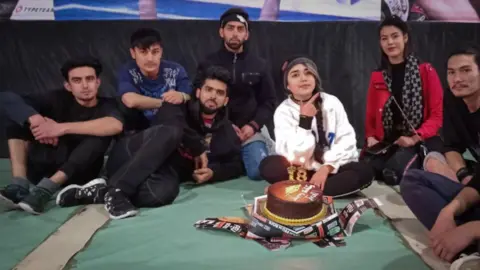Manizha Talash knew the moment she first saw a video of a man spinning on his head that she would dedicate her life to breaking – a style of street dance.
But it is a dream for which she has risked her life, and the lives of her family, in order to fulfil. It has forced her to flee her country, and hide her identity.
Now, as she prepares to step out on the world stage at the Paris Olympics, Manizha reveals her fight to become Afghanistan’s first female breaker.
Manizha came to breaking late.
She had initially tried shoot boxing, turning to the Japanese martial art that mixes wrestling and kickboxing as a way to protect herself as she worked alongside her father, selling groceries from his cart in the streets of the capital Kabul.
But a few matches in, she broke her shoulder and had to give up.
Then, aged 17, she saw the video of the man on his head – and soon discovered the Superiors Crew, a breaking collective based in Kabul.
She fell in love.
“I couldn’t believe it was real,” she says.
At the same time, she heard breaking would make its debut at the Paris 2024 Olympics. The dream was born – she just had to get there.
But it clearly wasn’t going to be easy from the start.
She visited the Superiors Crew’s training club in western Kabul, which was considered the country’s pioneering centre for hip-hop and breaking, but it was not quite what she expected.
“When I entered the club it was full of boys,” Manizha recalls.
The Superiors Crew’s coach, Jawad Saberi, was also quick to size Manizha up too.
“She was so small,” he remembers. “I was doubtful because there were other b-girls who didn’t stay long,” he says, using the term for a female performer.
But her size was the least of their troubles.
Manizha’s passion, shared with Jawad and the Superiors Crew collective, was risky and people were unhappy about it.
“Everyone was judging me… my relatives were saying words behind my back and complained to my mother,” she recalls.
Outside of her immediate family, there were also comments made on social media – which she didn’t take seriously.
But then, in December 2020, a car bomb exploded near the club, bringing the violence which was killing so many across Afghanistan close to home.
“It really scared me,” she admits.
Yet it didn’t stop her. For Jawad, it was all he needed to know.
“We were under attack, but she came back,” he says. “I saw that she had a dream to go to Paris 2024 – she was fighting for it. I said: ‘She can do it.’ I saw the future.”
At home, things had taken a turn for the worse.
Her father had been abducted by insurgents. He has not been seen since.
She became the main breadwinner for her family – a portion of which she saved for training.
But within months of the car bomb, the club was forced to shut its doors.
This time, the threat had come inside.
“Security forces stormed our club, walked over to a man and put a hood on his head,” Manizha recalls. The man, they said, was a would-be suicide bomber who had been staking out the club for some time, planning an attack.
“They told us that this time we were lucky because there were people who wanted to bomb our club and if we loved our lives, we should shut it.”
Even now, Manizha did not stop breaking.
She did make one concession to the danger, however: Manizha changed her last name to Talash meaning “effort” or “hard work” in Farsi. It was a decision she hoped would protect her family in case they were threatened because of her link to the sport.
And then, that August, the Taliban returned.

Suddenly, Manizha’s world – and the world of Afghan women and girls – began to contract.
They were barred from classrooms and gyms and told to wear top-to-toe clothing. Music and dancing were also effectively banned.
The breaking stopped.
The new restrictions forced Manizha and her friends to make a decision – they had to leave the country.
“If I’d stayed in Afghanistan, I don’t think I’d exist,” she says. “They’d execute me or stone me to death.”
Manizha and some members of the Superiors Crew, including Jawad, fled to Madrid in Spain.
They found work, and sent money home. But they also made connections with local breakers and practised anywhere they could – in clubs, on the streets and even in shopping malls.
It wasn’t easy.
“Every night when I got to bed, I’d struggle with lots of questions,” Manizha admits. “‘What can Afghan women do?’ I’d ask myself. ‘Why can’t I do something for them?'”

She knew that, following the Taliban’s return, it would be almost impossible to compete for her home country in the Olympics. A small, gender-balanced team of six is taking part under the country’s former flag – put together by the exiled Afghan Olympic committee, with no link to the Taliban.
But Manizha found another route to Paris. She had discovered she was eligible to compete for the Refugee Olympic Team, for athletes whose home countries are experiencing conflict or civil war, making it too dangerous for them to return.
In May, she was one of the athletes selected to represent the Refugee Team at the Games and the International Olympic Committee helped arrange coaching for her.
“When they announced my name, I was happy and upset all at once,” Manizha says. “I was sad because when I left Afghanistan, I had to leave my family behind. I chose my goal over their safety.”
But as she prepares for her Olympic debut on Friday, Manizha can breathe a little easier.
When she walks out in Paris and onto screens across the world, her family will be safe.
Just after she was selected, they managed to flee Afghanistan. Finally, after two years of separation, the family was back together in Spain.
Manizha admits it is unlikely that she will take home a medal from Paris – she still needs to “make up for all those years I lost”. But then, getting a spot on the podium is not her priority.
“I’ll compete for my friends and for their dreams and hopes,” she says.
“The girls of Afghanistan will never surrender. Whatever pressure you put on an Afghan girl – restrict her, or even imprison her – she’ll definitely find a way out and will definitely achieve her goals. We fight and we will win.”
 Afghanistan Peace Campaign
Afghanistan Peace Campaign